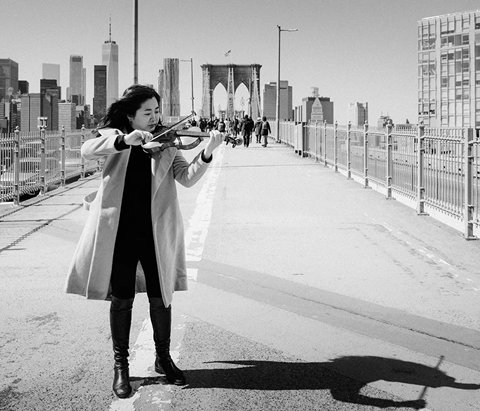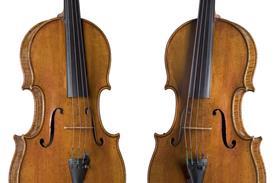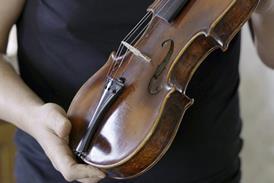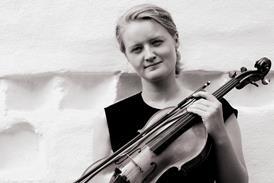The violinist speaks about how her experiences as a foreign-born citizen of the US laid the groundwork for her new album American Sketches, which features diverse repertoire from the country she now calls home

Discover more Featured Stories like this in The Strad Playing Hub
Violinist Kristin Lee presents American Sketches, her debut full-length recording. The album has a personal resonance for Lee; a native of Seoul, South Korea, she emigrated to the US at the age of seven, where playing the violin became a refuge from the challenges of moving country and its culture shocks.
As a foreign-born citizen of the US, Lee was compelled to select repertoire to express her pride in the country she now calls her own. She has recorded works by American composers Amy Beach, Henry ‘Harry’ Thacker Burleigh, James Louis ‘J.J.’ Johnson, Scott Joplin, Thelonious Monk, John Novacek, Kevin Puts and Jonathan Ragonese, that have a distinct and recognisable sound of American music and its rich history.
Lee speaks to The Strad about the influences behind her album.
You’ve mentioned that playing the violin was ‘your voice’ when you moved to the US from South Korea. Through your experiences, can you tell us more about how violin playing played a part in your childhood, and how it shaped you as a person?
When I moved to the US, I moved to a very small town in Alabama where at the time, I was the only Asian in my entire Elementary School. Even as a child, I felt and dealt with racism - kids made fun of my flat nose, the teacher removed me from the class when they were studying English, I didn’t have any friends I could sit with on the school bus. I felt terribly out of place and didn’t belong anywhere.
One of the greatest gifts in this small town where I really struggled was meeting this elderly couple who absolutely adored music. The wife was a journalist for the local papers, so when she discovered that a musical family moved into town from South Korea, she started writing about us in the local papers and arranged concerts in the local churches and country clubs for my mother, sister, and myself to perform in. My mother was a singer, my sister and I both played the violin. Word got around and when they discovered that I played the violin, I was no longer the ’Asian’ kid but the girl who played the violin. It literally gave me an identity that wasn’t established through the colour of my skin, but through the great gift of music.
Tell us about the works you’ve programmed for American Sketches. What brings them together, and sets them apart?
Every piece on this album is composed by an American composer but they are from different periods of time and different genres of music. When you give it a listen, it may sound very varied and all over the map, but the truth is that that’s what really represents American music - the variety of styles that represent diverse cultures, showcasing the beauty of individual expression.
Did these works coincide with any major events in your life? Tell us how they’re significant to you in your life, identity and musically.
Jeremy Ajani Jordan, who is my collaborator on this album, introduced me to the world of improvisation and created the three arrangements on this list - Gershwin’s But Not For Me, Jame Louis ‘J.J.’ Johnson’s Lament, and Scott Joplin’s The Entertainer. Jeremy wanted this to be an opportunity for me to try out some improvisation - a style that I’m not most comfortable with - and gave me the courage by writing out some of the tunes but also allowing sections for improvising.
Along with these three works, I was also introduced to Theolonius Monk through this project, and it allowed me to discover the beauty of simplicity and the art of long tones. I would say these pieces are pretty significant since it introduced me to a world of music that I wasn’t particularly familiar with but gave me the opportunity to learn and take more risks.
What advice would you give to young musicians who are going through what you experienced, such as moving to a new, unfamiliar and sometimes hostile environment?
My advice would be to allow yourself to feel uncomfortable and know that these are the experiences that will shape your future self. If you try to neglect the discomfort and find ways to find where it’s easier, it doesn’t allow you to grow. Although my experience as a child in the US was so difficult, it allowed me to learn English very quickly, define myself through my musical gifts, and helped me understand where I am unique and special. Looking back now, if I hadn’t endured those experiences, I don’t think music would have as much of a significance to me and I wouldn’t be as resilient as I am today.
American Sketches is out on First Hand Records on 15 November 2024.
Read: How do you take a violin to space? The story of astronaut Sarah Gillis and her violin
Read: Violinist Patricia Kopatchinskaja on the shadow world of Shostakovich
Discover more Featured Stories like this in The Strad Playing Hub
The number one source for playing and teaching books, guides, CDs, calendars and back issues of the magazine.
In The Best of Technique you’ll discover the top playing tips of the world’s leading string players and teachers. It’s packed full of exercises for students, plus examples from the standard repertoire to show you how to integrate the technique into your playing.
The Strad’s Masterclass series brings together the finest string players with some of the greatest string works ever written. Always one of our most popular sections, Masterclass has been an invaluable aid to aspiring soloists, chamber musicians and string teachers since the 1990s.
The Canada Council of the Arts’ Musical Instrument Bank is 40 years old in 2025. This year’s calendar celebrates some its treasures, including four instruments by Antonio Stradivari and priceless works by Montagnana, Gagliano, Pressenda and David Tecchler.





































No comments yet